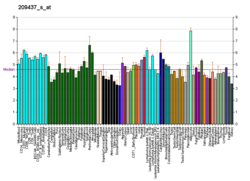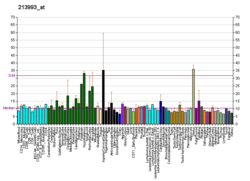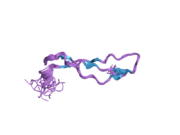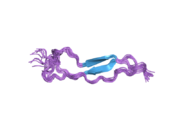Protein-coding gene in the species Homo sapiens
Spondin-1 (also known as F-spondin) is a protein that in humans is encoded by the SPON1 gene .[ 5] floor plate and may be involved in axon guidance [ 6] thrombospondin domains, one reelin domain, and one spondin domain.
References
^ a b c GRCh38: Ensembl release 89: ENSG00000262655 – Ensembl , May 2017^ a b c GRCm38: Ensembl release 89: ENSMUSG00000038156 – Ensembl , May 2017^ "Human PubMed Reference:" . National Center for Biotechnology Information, U.S. National Library of Medicine .^ "Mouse PubMed Reference:" . National Center for Biotechnology Information, U.S. National Library of Medicine .^ Nagase T, Ishikawa K, Suyama M, Kikuno R, Miyajima N, Tanaka A, Kotani H, Nomura N, Ohara O (Apr 1999). "Prediction of the coding sequences of unidentified human genes. XI. The complete sequences of 100 new cDNA clones from brain which code for large proteins in vitro" . DNA Res . 5 (5): 277– 86. doi :10.1093/dnares/5.5.277 PMID 9872452 . ^ "Entrez Gene: SPON1 spondin 1, extracellular matrix protein" .
Further reading
Nakajima D, Okazaki N, Yamakawa H (2003). "Construction of expression-ready cDNA clones for KIAA genes: manual curation of 330 KIAA cDNA clones" . DNA Res . 9 (3): 99– 106. doi :10.1093/dnares/9.3.99 PMID 12168954 . Klar A, Baldassare M, Jessell TM (1992). "F-spondin: a gene expressed at high levels in the floor plate encodes a secreted protein that promotes neural cell adhesion and neurite extension". Cell . 69 (1): 95– 110. doi :10.1016/0092-8674(92)90121-R . PMID 1555244 . S2CID 14880785 . Bonaldo MF, Lennon G, Soares MB (1997). "Normalization and subtraction: two approaches to facilitate gene discovery" . Genome Res . 6 (9): 791– 806. doi :10.1101/gr.6.9.791 PMID 8889548 . Miyamoto K, Morishita Y, Yamazaki M (2001). "Isolation and characterization of vascular smooth muscle cell growth promoting factor from bovine ovarian follicular fluid and its cDNA cloning from bovine and human ovary". Arch. Biochem. Biophys . 390 (1): 93– 100. doi :10.1006/abbi.2001.2367 . PMID 11368520 . Gonzalez de Peredo A, Klein D, Macek B (2002). "C-mannosylation and o-fucosylation of thrombospondin type 1 repeats" . Mol. Cell. Proteomics . 1 (1): 11– 8. doi :10.1074/mcp.M100011-MCP200 PMID 12096136 . Strausberg RL, Feingold EA, Grouse LH (2003). "Generation and initial analysis of more than 15,000 full-length human and mouse cDNA sequences" . Proc. Natl. Acad. Sci. U.S.A . 99 (26): 16899– 903. Bibcode :2002PNAS...9916899M . doi :10.1073/pnas.242603899 PMC 139241 PMID 12477932 . Ota T, Suzuki Y, Nishikawa T (2004). "Complete sequencing and characterization of 21,243 full-length human cDNAs" . Nat. Genet . 36 (1): 40– 5. doi :10.1038/ng1285 PMID 14702039 . Ho A, Südhof TC (2004). "Binding of F-spondin to amyloid-beta precursor protein: a candidate amyloid-beta precursor protein ligand that modulates amyloid-beta precursor protein cleavage" . Proc. Natl. Acad. Sci. U.S.A . 101 (8): 2548– 53. Bibcode :2004PNAS..101.2548H . doi :10.1073/pnas.0308655100 PMC 356987 PMID 14983046 . Gerhard DS, Wagner L, Feingold EA (2004). "The status, quality, and expansion of the NIH full-length cDNA project: the Mammalian Gene Collection (MGC)" . Genome Res . 14 (10B): 2121– 7. doi :10.1101/gr.2596504 . PMC 528928 PMID 15489334 . Pyle-Chenault RA, Stolk JA, Molesh DA (2005). "VSGP/F-spondin: a new ovarian cancer marker". Tumour Biol . 26 (5): 245– 57. doi :10.1159/000087379 . PMID 16103746 . S2CID 13409234 . Otsuki T, Ota T, Nishikawa T (2007). "Signal sequence and keyword trap in silico for selection of full-length human cDNAs encoding secretion or membrane proteins from oligo-capped cDNA libraries" . DNA Res . 12 (2): 117– 26. doi :10.1093/dnares/12.2.117 PMID 16303743 . Kitagawa M, Kudo Y, Iizuka S (2006). "Effect of F-spondin on cementoblastic differentiation of human periodontal ligament cells" (PDF) . Biochem. Biophys. Res. Commun . 349 (3): 1050– 6. doi :10.1016/j.bbrc.2006.08.142 . PMID 16965763 .
External links










